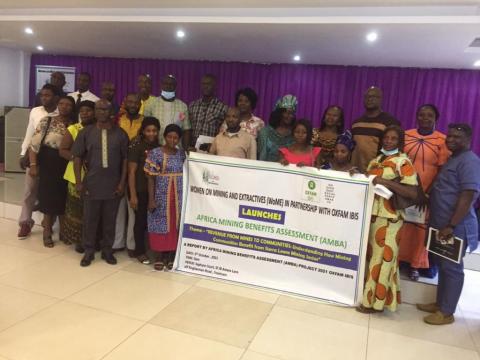By Mabinty M. Kamara
In an effort to bridge the capacity gap and ensure Sierra Leone benefits from its extractive sector, advocates have called on the government and other development partners to establish a standardized mining university that can train mining engineers and experts in the country.
Speaking at the launch of a report on the Africa Mining Benefits Assessment (AMBA) by the Oxfam Ibis and partners Women on Mining on Mining and Extractive-Sierra Leone, Ibrahim Bockarie representing Campaign for Just Mining emphasized the need to have a specialized university in the country that trains mining experts. This according to him will prevent the country from decisions being made by foreign experts and the issue of mining companies bringing in experts at a high cost to work in the country leaving the indigenes with menial jobs to do on mining sites and companies. This he said is a contributing factor to century old problem of the mining industry’s inability to develop the country and its people.
Speaking at the launch of the AMBA report in Freetown on Tuesday 5th March 2021, the Executive Director of WoME, Esther Finda Kandeh said the research was done by Oxfam IBIS to understand how communities benefit from the mining sector. She referenced similar research done by her organization last month that reveals unfair distribution of mining revenues meant for community development against women. “We cannot continue to mine like this,” she said.
She therefore called on Sierra Leoneans to treat mining issues seriously as it a national affair.
Presenting the research, Nuru Deen, Influencing Coordinator at Oxfam said the report which targeted seven countries namely Sierra Leone, Burkina Faso, Niger, Ghana, Uganda, Zambia, and Mozambique , is aimed at supporting civil society to positively influence the transfer and use of local mining benefits in Sierra Leone, encourage civil society to engage with mining companies and government organizations to ensure that mining communities are aware of and further enabled to enjoy their rights to shared mining revenues and to generate an active dialogue between local mining communities and key actors to improve policy and practice by identifying actions that can be taken to better the livelihoods of mining communities with specific applied Political Economy Analysis.
Presenting the findings, he noted Entrenched Hierarchical Governance Arrangements, Prioritizing Foreign Investment over Local Development Needs, noting the Human Rights Watch report into the Tonkolili iron ore mines, and weak regulatory structures are unable to effectively protect the rights of local citizens. “They assert that the central government has prioritized attracting investment over the needs of communities,” he said.
He went on to note failures of large companies to understand local context, pressures from traditional authorities, to challenge in the successful establishment of the Community Development Agreement (CDA) Technical Committees have contributed to the National Minerals Agency (NMA) adopting a new structure into the CDA process being called the ‘Steering Committee’ as part of the findings.
“Overall, it can be fair to say that the process is holding but it is cracking. Conflict between communities in Kono over CDA benefits and a lawsuit have created tension amongst the Octea CDA signatories. Concerns over the creation of the Steering committees and a universal concern regarding the capacity of CDC members to meaningfully represent their communities exist in all CDA communities,” the report reads.It added: “Transparency and accountability at the CDC and Steering Committee levels is a concern – we are not seeing reports coming out of the CDC meetings. The CDC members generally lack the capacity to accurately identify community needs. Some communities feel marginalized by the CDA because of a sense of the process being overly complex and there being poor consultation with the community”.
The researchers therefore recommended that the CDA process maintain integrity, transparency and be consistently applied to communities, and that more must be done to ensure appropriate representatives with appropriate capacity are engaged as CDC members. It added that the role of the Mining Companies and the role of Civil Society in the CDA process must evolve.
Responding to the findings of the report, Edward Koroma, Project Manager, Transparency International Sierra Leone said mining communities remained underdeveloped because proceeds from mining meant for the communities end up in the pockets of individuals due to lack of transparency and accountability. He applauded the work of Civil Society Organizations that are helping to restore sanity into the sector. He noted that reviewed mines and minerals Development bill will ensure transparency, when legislated.
He added that the CDA needs to be reviewed to enable the CDC operates effectively when they receive the sub-national transfer for the benefit of the communities.
In his statement, the Deputy Permanent Secretary in the Ministry of Mines and Minerals Resources, Emmanuel M. Sandi said the report is important to their policy formulations. He added that his ministry was critical to support development projects. He noted that they have been monitoring the projects implemented by the Community Development Fund to ensure they benefit the communities.
In his address before the Launch of the report, the national Coordinator, Sierra Leone Extractive Industries Transparency Initiative , Mohamed Baimba Koroma said that there are no one-size-fits-all to the underlying issues affecting mineral exploitation, noting that several approaches have been advanced by the World Bank, Natural Resource Governance Institute, the African Mining Vision and the inter-governmental forum on how communities could leverage on the opportunities that comes with mining.
The launching brought together CSOs, academics and government officials.
Copyright © Politico Online (06/10/21)








